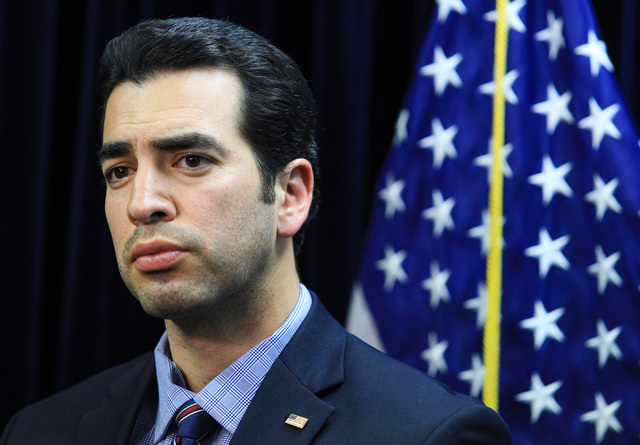Dennis Myers: Democrats not sensitive to civil liberties?
In any public furor, there is usually a point where it is possible to see it is going too far.
During Watergate, there were times when Democrats pushed beyond the available evidence and Republicans – of all people – started complaining about McCarthyism.
During one of the drug war hysterias, the “jar wars” (when candidates for office emerged from bathrooms brandishing jars of urine to prove their drug-free status) were a good sign that we were too fixated on drugs.
This week, when a couple of Democratic officials called on fellow Democrat Ruben Kihuen of Nevada to resign from Congress, was one of those benchmarks.
The uproar over sexual harassment is one in which all of us have been feeling our way.
With many of these cases, there are not necessarily the customary yardsticks to follow. Some of the cases involve statutes of limitation that have expired.
Some are cases that have already been settled legally. With no one under oath, members of the public have to decide for themselves which cases to consider credible.
A case from the entertainment industry made that easier when many people felt that because Bill Cosby was accused by 60-plus women, judging him had been made easier.
In political cases, some let their ideologies influence their view of the credibility of the accusations. If they already admired Roy Moore, they may have been inclined to discount the believability of his accusers. If they already opposed Moore’s views, they may have welcomed anything that undercut his standing with the public. That is not, however, a great way to determine guilt.
In the case of Donald Trump, he in effect confessed his guilt on the Billy Bush tape.
He also apologized for it at the time the tape was disclosed, the sincerity of that apology now in doubt as he has recently claimed the tape was faked. In the days after the tape was released, at least 15 women came forward to report being sexually abused by Trump.
All those items gave voters a way of assessing Trump’s conduct.
The place Kihuen’s case takes in this debate can be seen by looking at the four members of Congress who are now under pressure to resign.
They are Republican Blake Farenthold of Texas and Democrats Al Franken of Minnesota, John Conyers of Michigan, and Kihuen of Nevada.
In the case of Farenthold and Conyers, both have already paid out settlements to accusers, using taxpayer money. (How that is possible without the cases becoming public is something that really should be addressed separately before this commotion runs its course, but it certainly shows an incredible secretive Capitol Hill culture.)
Because those settlements were paid, members of the public have a piece of information which will likely incline them to believe those congress members were guilty, whether the paperwork that accompanied the settlements conceded such or not.
In the case of Franken, a photograph of him behaving inappropriately was made public at the same time as the first accusation against him. That was followed by another four women coming forward to accuse him.
Where does Kihuen fit into all this? A 25-year-old former finance aide said this month that last year, she quit her job on Kihuen’s campaign because of what she claims were repeated, unwelcome propositions for dates and sex.
At this writing, that is the entire case against Kihuen.
No other women have come forward. There is no other known history of such behavior by Kihuen. It is straight “she said/he said”, and he says he does not remember their encounters the way she does, even while praising her work on his campaign. That may change, but it won’t alter the way Democratic leaders reacted.
Democratic Congressional Campaign Committee chair Ben Ray Lujan, promptly and with no further investigation, said Kihuen should resign. House Democratic leader Nancy Pelosi was not much further behind with her demand for Kihuen’s resignation, and no more thorough in inquiring into the facts of the case.
When Franken was accused, Senate party leaders Mitch McConnell and Chuck Schumer forwarded the case to the Senate Ethics Committee for investigation, and they had a better case against Franken than Lujan and Pelosi have against Kihuen.
Aren’t Democrats supposed to be more sensitive to civil liberties than Republicans?
When does the temperature get so great that civil libertarians melt from the heat?
Dennis Myers is an award-winning journalist who has reported on Nevada’s capital, government and politics for several decades. He has also served as Nevada’s chief deputy secretary of state.











